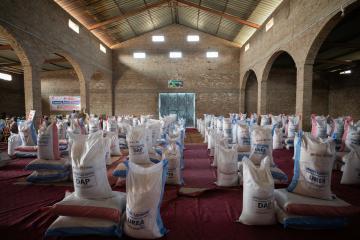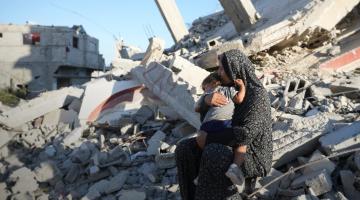The DEC brings together 15 leading UK aid charities at times of crisis overseas to raise money more efficiently. We respond to large scale emergencies with fast and coordinated responses, to address people’s needs in times of crisis.
We have three criteria which must be met before we start the process of launching a national fundraising appeal. You can read more about our appeal criteria here.
DEC appeals have a set lifecycle, so that we can make the biggest impact possible, while also ensuring we are ready to respond to the next crisis that meets our criteria. However, our member charities and their local partners often continue working in affected communities and addressing the longer term needs.
Below is a further look at our appeal process, as well as when and why we close appeals and stop accepting donations.
How does the DEC decide when to close an appeal?
DEC appeals are designed to be time-limited emergency appeals, boosting our member charities’ ability to respond to a crisis at scale. DEC appeals are not ongoing fundraising causes, as this is the remit of our member charities and their continuing work across the world. The purpose of a DEC appeal is to support members to scale up their emergency response immediately and for two years from the day of launch. This is sometimes increased to three years for larger scale or more complex disasters.
All funds raised through the appeal must be spent in this window, so it is necessary to close an appeal in advance of this, to help DEC members plan their future work appropriately. Once an appeal has closed for donations, member charities will continue to spend remaining funds to support the affected communities for the full two years.
As an appeal comes to the end of the two-year period, our members wind down their DEC funded operations or begin to phase them out, something that is planned very carefully in consultation with affected communities and local partner organisations. In some cases, allocating more funds can disrupt the remaining programme delivery, affecting their ability to phase out support.
Why does the DEC close appeals when there is still need?
The DEC is an emergency fundraising mechanism, designed to support our 15 member charities to scale up their responses to major humanitarian disasters. The work we support is immediate, using funding to provide a swift and coordinated response, addressing immediate needs and potentially saving lives.
After two (or in exceptional cases three) years, the DEC’s emergency funding for our member programmes will end. Members will then often continue to work in the country with their local partners, community-based organisations and civil societies using public donations or grants from institutions.
This means they can continue supporting and addressing longer-term needs of communities, as they are best placed to do so and will be present in the country longer, sometimes indefinitely.
Are there ways to keep donating to a crisis after the DEC appeal is closed?
In many instances, members have their own appeals open for crises that the DEC launched for, and these may remain open after the DEC has stopped receiving funds. We will continue to signpost these ways to donate to specific crisis through the DEC website.
Additionally, many of our member charities will have ongoing projects and programmes in the areas and countries affected by the crisis. Donations to our member charities help them to carry out vital longer term work.
How do programmes differ from the first weeks of a response compared to months/years on?
The first phase of the response (Phase 1) runs for six months, focusing on emergency aid delivery: food security, shelter, water, sanitation, and hygiene through clean drinking water and hygiene kits, and delivering medicines.
The second phase of a DEC response (Phase 2) is usually between 18–30 months, depending on the nature of the crisis. This phase focuses on recovery and reconstruction, as well as providing emergency aid where still needed. Typically, Phase 2 focuses on recovery of people’s livelihoods, strengthening local capacity through training initiatives, and permanent shelter reconstruction.
This work continues for two years, occasionally three for larger scale crises. For example, the 2015 Nepal Earthquake Appeal was extended to three years. This was due a remaining high level of need, paired with a large amount of available funds to allocate to our members.
Similarly, the 2022 DEC Ukraine Humanitarian Appeal was extended for an extra year in response to the ongoing nature of the conflict and the scale of the donations we received. In Ukraine and neighbouring countries, the Phase 2 response of DEC charities continued to provide services such as mental health support, children’s education and cash assistance into a third year in response to the ongoing effects of the conflict on the population.
Throughout both phases, members adapt to the evolving needs of communities and use a ‘flexible funding’ approach, ensuring the right support is being provided at the right time.
What is flexible funding and how does it work?
When funding a humanitarian response, some donors have strict regulations around what can be funded, for example not allowing changes midway through a response if a situation changes.
However, the DEC utilises and encourages a flexible approach to humanitarian funding. Our experience tell us it is crucial to remain versatile to evolving needs as they develop. Our members can request changes midway through their programmes. Changes can be made to locations, target groups, activities and more as the circumstances in a crisis continue to evolve.
Our member charities request changes based on feedback from communities or after completing needs assessments. Occasionally, members will also change their programmes based on security issues, or if a significant event has happened in the area.
For example, during the 2021 DEC Afghanistan Crisis Appeal, a series of devastating earthquakes hit the affected areas 21 months into the response, where members were running programmes with DEC funds. During the response, several DEC members changed their focus to address the evolving needs of those impacted by the earthquakes, providing emergency shelter, food, and medicine for the affected communities.
This approach ensures that funds are spent quickly and effectively, as well as ensuring accountability to the affected communities and helping their needs be best served by member charities.
Do DEC charities do Disaster Risk Reduction (DRR) work and does this continue after fundraising has closed?
Disaster Risk Reduction (DRR) is work conducted to make disasters less likely to happen, or less damaging when they do happen.
Predominantly DEC members undertake DRR work during the ‘recovery’ part of the response (Phase 2), although occasionally during Phase 1, depending on the nature of the crisis. For example, during the 2022 Pakistan Floods Appeal, DEC members focused on building-back-better approaches, designed to protect communities from the effects of future floods. This included the construction of walls to contain flood and rainwater so that it can be used for farming and organising a tree planting campaign which mobilised young people from local villages.
Similarly, the DEC responded to the devastating floods in Pakistan in 2010. As a result of this previous response, DEC members looked carefully at the lessons learned from the 2010 floods and worked to apply them to the 2022 flood response, for example through a study completed by the London School of Economics (LSE).
Members continue to deliver DRR initiatives and support after DEC fundraising appeals close and programmes have ended. This is a crucial way in which humanitarian interventions can provide durable solutions and assistance for affected communities in the future.
What happens to the money raised after appeals are closed?
Money raised through DEC appeals is distributed between our member charities, which they use to fund activities supporting communities affected by that specific crisis.
These allocations are made to our member charities throughout the lifecycle of an appeal and are dependent on their presence in country, size of operations and other factors. As a rule, we make sure no member charity receives less than 3% or more than 20% of funds available to allocate.
When an appeal closes to the public and fundraising ends, remaining funds are allocated to our members and spent within the programme timeline, remaining restricted to the crisis it was donated towards.
This allocation helps reduce the need of the potential for returning unspent funds, members inform the DEC if they are unable to spend the money in the remaining programme timeframe, and if so, the DEC reallocate this funding to other members who can absorb and spend the money.
Are communities still supported after an appeal is closed?
Depending on the country and crisis, our member charities will often continue working with communities DEC funds were supporting.
For example, in an ongoing crisis such as Syria or Afghanistan, many of our members have had a presence in country for many years, and will continue to do so, even without DEC funds, as needs among those affected are still so high.
DEC members also work closely with their local partners, community groups and sometimes government bodies, to help affected communities respond to future crises.
This support can be delivered through training sessions on areas like safeguarding and violence prevention, as well as training healthcare workers, farmers and other members of the community with key skills.
This helps to empower local partners to continue work, even when DEC funds have been spent, and if members do not continue operating in the affected areas with their own funding sources.
Does the DEC have a general emergency fund?
At a time when the DEC does not have multiple open appeals, donations can be chosen to be directed towards our emergency fund.
Whether it’s a natural disaster, a disease outbreak or crisis fuelled by drought or conflict, we cannot predict what the next DEC appeal will be for. However, the emergency fund helps to allow our member charities to provide aid where it is needed as quickly as possible when a DEC appeal is launched, providing a headstart whatever the crisis may be when the time comes.
READ MORE

Explained: When does the DEC launch a nationwide appeal?

How DEC charities ensure aid gets to the people who need it

